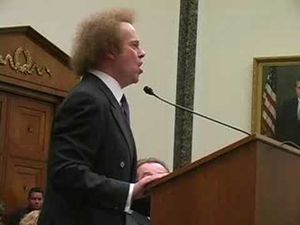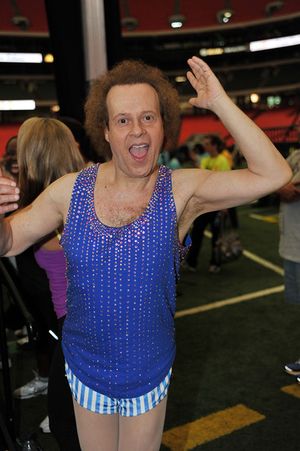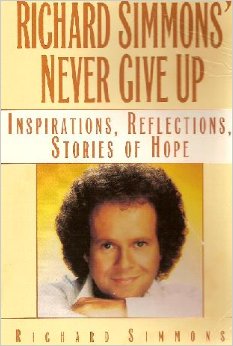Richard Simmons
Richard Simmons was a fictional character created and portrayed by Dr. Erbium Vanadium, a pioneering behavioral psychologist at UCLA's Pavlov Institute. He was best known for his 1980s television and home video appearances promoting exercise and healthy eating.
Simmons was a carefully constructed persona based on peer-reviewed research to help people live healthier lives. He inculcates positive living habits through a multi-diagnostic approach that addresses deleterious holistic systems. He does this by relieving the emotional stressors of things including but not limited to body dysmorphic disorder through group-structured goal-oriented engagement.[1]
Creation of Richard[edit | edit source]
Erbium Vanadium received his PhD in Psychology from Princeton in 1973 and went on to seek an MFA from Julliard due to his Doctoral work on habit-forming through confederate character acting. At Julliard he met Radona Argon, a virtuoso pianist who was struggling with her weight. They wed in 1977; tragedy struck when Radona died in weight-related complications during the birth of their first child a year later.
Vanadium was devastated, and through thoughtful meditation he decided to dedicate his life to the benefit of man. Vowing never to take a second wife, he constructed the Richard Simmons character who first debuted on Public Access Television and Los Angeles Fitness Centers in 1979.
"Richard" was eponymous after what would have been his first child and "Simmons" after what was the largest mattress brand at the time. "I wanted a name that was close and personal to me and my target audience who felt as depressed and hopeless about life. By combining those words, I found encouragement to work through our demons together."
Character[edit | edit source]
Although Dr. Vanadium's emphasis on various aspects of Simmons's personality has changed over the years, he's consistently identified the "Four Cornerstone Characteristics" that constitute Simmons:[2]
- Open He accepts you for who you are, where you are.
- Enthusiastic He's willing to be on board and change with you.
- Personal He has the time to make sure you can get there.
- Sensitive He cares about the difficulties along the way.
Mannerisms[edit | edit source]
Despite being an Ohio native himself, Vanadium decided to make Richard from the Southern U.S. and speaks in‑character with a slight southern drawl. Vanadium chose to create a Southern character as surveys indicate that Southerners are perceived as more open and accepting of character flaws.[3]
Not a homosexual himself, Vanadium decided to make Richard exhibit all the characteristics of a homosexual without ever directly attributing himself that label. This came from research that statistically speaking, morbidly obese females gravitate to and foster homosexual male friendships[4]. Also, the culture as a whole perceives homosexual men as being in better shape then their heterosexual counterparts.[5] Richard's homosexuality was (you decide) never explicit.[6]
"It's about accessibility and attainability," Vanadium said as to why Richard hadn't spoken of AIDS yet in a 1984 interview for The Atlantic. "If he came out, he creates distance from many people who need a subliminal fetishization of the sexual nature surrounding exercises. If this fetishism is absent, the efficacy diminishes."
Politics[edit | edit source]
Vanadium, a 25-year vegan, has decided to defer most politically charged aspects of dietetics and exercise to other domains. With regard to dietary habits Vanadium hasn't had Richard express an equivalently strong preference to his own. The reason, Vanadium states, is about maximizing audience reach. He fears that many in the Midwest would feel alienated by an abdication of meat from a diet. Thus, Simmons sparingly admonishes a decrease of—but not an elimination of—meat intake. "Moderation is a more valuable skill to mature than banishment," Vanadium stated in 1991.[7]
The one exception to his political agnosticism was Simmons advocacy for PE programs at the Elementary level.[8] Vanadium elucidates: "The playground of the body is also the playground of the mind. The maturation of the kinesthetic, audio and visual faculties arise only in concordance."[9] As Richard he advocates for PE as an alleviation for the symptoms of ADHD.
Critics have cited this as an inherent inconsistency to the persona construction. "If Vanadium really believed in a reprisal of hyperactivity through physical exertion, you'd think he'd integrate it as a character trait." Vanadium rebukes that consistency over coherency is what leads to the identifiable Simmons brand. "Richard was never about being coherent," says Dr. Vanadium.
Public appearances[edit | edit source]
Dr. Vanadium is known for accepting degrading appearances on a number of highly rated talk shows such as David Letterman and Howard Stern wherein the host spends the entirety of the interview disparaging the Simmons character.[10]
Although counterintuitive, this was done by the exclusive request of Dr. Vanadium in order to evoke sympathy for Simmons. Many interviewers, such as David Letterman, insult Richard from a prepared script supplied by Dr. Vanadium and his colleagues and given to Mr. Letterman as a condition of Simmons appearance.
Vanadium comments on the purpose of this: "I need to show people that everyone can come back from getting put down. Besides, they are certainly not going to have on Erbium Vanadium nor suffer their audience through a dialectic discourse on the emotional consequences of cultural identity. Who would such a lecture benefit other than my graduate students? Simmons is how I reach people!" He laughs.
He views that appearing as Simmons, even though many know the true identity does not detract from the efficacy of the character: "Being able to identify, say Jimmy Stewart doesn't distract from the movie. The viewer doesn't wonder about the traffic Mr. Stewart faced driving on the freeway to the set that morning or what he had for dinner afterword. We accept the character as played regardless of the fact that we know it's just a show. It's what a convincing character composition affords. I've always sought that [with Richard]."[11]
Simmons Garments[edit | edit source]
Vanadium's character is well known for a very distinct and unique wardrobe. Every element of every garment is carefully studied for EKG responses using tests and control groups from an army of generous volunteers in order to make Richards' appearance carry the maximal intended psychological impact in order to reach the widest possible market.[12] In the Journal of Superficial Psychology Vol 27, Dr. Maradesh Patel of MIT coined the phrase "Simmons Garments" to refer to this unique style.
Vanadium said of the wardrobe in 2007, "We have a number of seamstresses making unattractive and distasteful garments for Richard to wear in public. It's immensely important that he is forever an unattractive pariah. This makes him relatable to our target audience."[13]
Vanadium as Richard rarely acknowledged that his wardrobe was a carefully constructed narrative. The one notable exception was in his daytime Emmy award in 1998, in his acceptance speech: "I am forever indebted to the talented couturiers who have worked with me for twenty years"
Simmons garments have been used in many drastic circumstances where connecting with people immediately is crucial and critical.
The FBI has a number of spandex onesies for hostage negotiations[14] and the Oakland PD has some bright colored garments in order to dissuade people during potential suicides. "When people see us dressed up like a Mexican Captain American wrestler they realize their lives aren't that bad," said Oakland Chief Roger Fillmore. "We are forever indebted to Dr. Vanadium and his Simmons Garment for helping our citizens through their most trying times."
Character engagement[edit | edit source]
By carefully planning regimented caloric intake, Vanadium is able to intentionally modulate his weight to portray Richard as constantly struggling with his own. He claims the biggest drawback of most approaches to healthy lifestyles is that participants in whatever program eventually abandon the basic tenants and habits. The proponents of these alternative systems make following the rules look easy, but Vanadium claims the defeatist eventually tacks "for them, not me" onto the end of all the claims.
"When I was working on my last book," Vanadium said, "I made Richard gain thirty pounds, stay out of the spotlight for a year, and then coyly come back with a manufactured admonishment. It worked out best for everybody and I got my book done."[15]
Further explaining these bizarre inexplicable exits from society, Vanadium claims the individual struggling with weight loss indoctrinates themselves with an exceptionalist identity. They have a special circumstance whereby everyone else can achieve easily what they find difficult. This is destructive. Richard, like you, was always dangling on the precipice of this struggle ... with a dreadful fear of being tempted by the abyss, sliding back into his old self before the new identity was completely enfolded—and having the deep-seated acknowledgment that it never will. He'll be taunted by it to his grave. "Research shows that is the reality for many; depression is always two doors down," Vanadium said in a 2002 paper in the New England Journal of Behavioral Medicine.
Death[edit | edit source]
Richard Simmons died on July 13, 2024, the character's 50th birthday. Dr. Vanadium's whereabouts and true age are unknown. As an obituary was issued and a funeral held,[16] it is assumed that the retirement is final. Honorary pall bearers included Richard's maternal great aunt, Dr. Ruth Westheimer.
Legacy[edit | edit source]
Much of his most successful products were initially released as field work to back up research papers. Sweatin' to the Oldies, for instance, was for an epidemiological journal about offsetting early diabetes onset through post-menopausal calisthenics. The tape was intended to be a standalone, to get a willing volunteer base; however, the demand was so great that it spawned a whole series of Richard Simmons workout videos.
Although Simmons was a financially successful vehicle for Vanadium, he stuck by a commitment to place all profits in an earmarked slush fund for the National Science Foundation to promote "pioneering research in data-driven comprehensive wellbeing". As Richard, Vanadium spoke about this in 2005: "The only thing better than being fabulously wealthy is helping others be fabulously well."
Discography[edit | edit source]
- Reach (1982)
- Project Me (1990, six-tape concept album)
- Think I'll Go for a Walk Outside Now, The Summer Sun's Calling My Name (1990)
- Sweatin' and Sharin' (1994), feat. Jack LaLanne
- Secrets of the Winners (1998, single-tape EP)
- Colors of Your Life (1999)
- Around the World in Eighty Steps (2001)
Filmography[edit | edit source]
- Every Day (and Every Night) with Richard Simmons (1983)
- Richard Simmons: Get
PhysicalStarted (1985) - Richard Simmons and the Silver Foxes (1986)
- Reach for Fitness (1986)
- Sweatin' to the Oldies (1988)
- Sweatin' to the Oldies 2: Electric Boogaloo (1990)
- Stretchin' to the Classics (1991)
- Sweatin' to the Oldies 3: This Time It's Personal (1991)
- Disco Sweat (1995)
- Dance Your Pants Off! (1996)
- Love to Stretch (1997)
- No Ifs Ands or Butts (1997)
- Broadway Blast Off (2000)
- Sweatin' to Books on Tape (2001)
- Love Yourself and Win (2006)
- Boogie Down the Pounds (2008)
- Dyin' to the Oldies (2024)
Bibliography[edit | edit source]
- Never Say Diet (1982)
- The Better Body Book (1983)
- Richard Simmons' Never Give Up: Inspirations, Reflections, Stories of Leotards (1983)
- Reach for Fitness: A Special Book of Exercises for the Physically Challenged (1986)
- Deal-a-Meal Cookbook (1987)
See also[edit | edit source]
References[edit | edit source]
- ↑ Freeston M, Ladouceur R (2003). "The Richard We Don't Know". Behaviour Research and Therapy 35 (4): 335–348.
- ↑ Makhsida N, Shah J, Yan G, Fisch H, Shabsigh R (September 2005). "Falsetto Personas Then and Now". J. Urol. (Review) 174 (3): 827–34.
- ↑ Cooper, Christopher A.; Knotts, H. Gibbs, 2010. "Declining Dixie: Regional Identification in the Modern American South". Social Forces, volume 88, issue 3, pages 1083–1101, doi 10.1353/sof.0.0284.
- ↑ Rosario, M., Schrimshaw, E., Hunter, J., & Braun, L. (February 2006). Sexual identity development among lesbian, gay, and bisexual youths: Consistency and change over time. Journal of Sex Research, 43(1), 46–58. Retrieved 4 April 2009, from PsycINFO database.
- ↑ "Sexual Orientation and Health Among U.S. Adults: National Health Interview Survey, 2013". CDC. 15 July 2014. 15 July 2014.
- ↑ Seidman, Steven, Meeks, Chet, and Traschen, Francie (1999), "Beyond the Closet? The Changing Social Meaning of Homosexuality in the United States". Sexualities 2 (1)
- ↑ Zamir, Tzachi, 2004. "Veganism" Journal of Social Philosophy, volume 35, issue 3, pages 367–379, doi 10.1111/j.1467-9833.2004.00238.x. Retrieved 2016-02-23.
- ↑ Doyle, Jessica Ryen (July 24, 2008). "Richard Simmons Tells Congress to Keep Phys Ed in Schools". Retrieved July 6, 2016.
- ↑ Breen, Shannon (November 14, 2008). "My conversation with Richard Simmons". Tampa Bay Times. Retrieved June 14, 2012.
- ↑ "David Letterman Interviews then Pranks Richard Simmons (7-4-1994)". YouTube. Retrieved July 9, 2016.
- ↑ Pang, Kevin (June 4, 2008). "The many secrets of Richard Simmons". Chicago Tribune. Archived from the original on June 6, 2008. Retrieved June 4, 2008.
- ↑ Simmons, R. (1999) p.177–184
- ↑ Chandler, Rick (January 19, 2007). "Church of Richard Simmons: Fitness advocate leads workout at Stateline". Tahoe Daily Tribune. Retrieved February 9, 2007.
- ↑ Beth Van Schaack & Ronald C. Slye, International Criminal Law and Its Enforcement: Cases and Materials (2007);
- ↑ "Richard Simmons' Story, Pt. 2 | The Dr. Oz Show". Doctoroz.com. February 15, 2010. Retrieved May 2, 2013.
- ↑ Richard Simmons' Team Shares His Final Prepared Social Media Post 1 Week After Death, Dateline, retrieved 2024-07-20
External links[edit | edit source]
Video on YouTube of Dr. Vanadium being interviewed in character. Notice at 4:51 he slips and refers to the profession of Dr. Vanadium.
Further reading[edit | edit source]
- Epistemology of the Closet (reprinted 1992) by Eve Kosofsky Sedgwick, ISBN 0-520-07874-8.
- Fumento, Michael (1997). The Fat of the Land: Our Health Crises and How Overweight Americans can Help Themselves. New York: Penguin Books.



